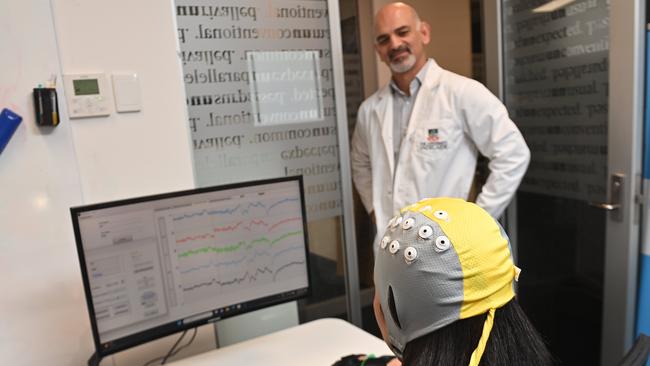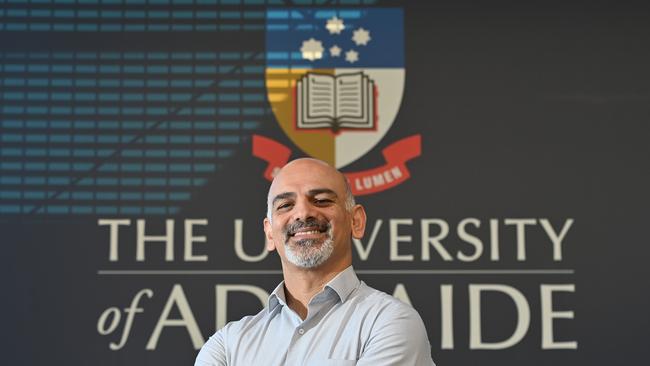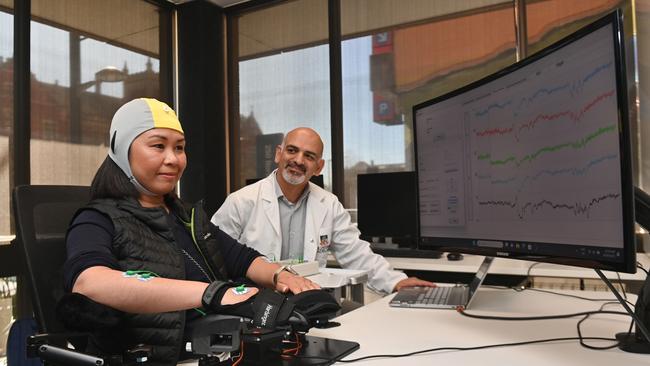AI and bionic hands helping stroke survivors recover movement
An Adelaide tech company is using AI and bionic hands to help stroke victims – including one NSW woman diagnosed with the ultra rare “foreign accent syndrome”. See the video
SA News
Don't miss out on the headlines from SA News. Followed categories will be added to My News.
Artificial intelligence and bionic hands offer new hope for stroke survivors with limited arm mobility — including a woman who credits it with also helping her overcome the ultra-rare foreign accent syndrome.
Melanie Valdes, 41, regained consciousness after a stroke last November and as she slowly regained speech, it came with a French-South African accent — despite the Sydney-born woman having a Filipino-Spanish heritage.
First described in 1907, just over 100 cases of foreign accent syndrome have been reported worldwide – where a person regains consciousness from a head injury, such as a stroke, and starts speaking with a foreign accent.
Mrs Valdes, an IT worker, researched her rehabilitation options.
She found Adelaide company RehabSwift – which operates a clinic in the University of Adelaide’s ThincLab complex – helping stroke survivors retrain their brain to recover movement and strength of arms and hands.

RehabSwift founder Dr. Sam Darvishi said the clinic uses “brain computer interface technology” to retrain damaged neural pathways or to form new ones.
“We have developed the world’s first personalised brain-computer interface technology, aiming for the rapid recovery of movement in stroke survivors,” he said.
“It allows you to re-wire the damaged pathway between your brain and hand muscles.
“It harnesses the power of the mind to significantly enhance rehabilitation outcomes.”
Patients are hooked up to brain monitors and attached to a bionic hand.
When the person tries to move their hand, the technology records the brain signals, translates it and sends this signal to the bionic hand attached to the person which physically manoeuvres their hand accordingly.

Dr Darvishi said the feeling and perception of movement completes the neural feedback loop, and strengthens and renews neural pathways, so by repeating this process the stroke survivor can improve movement of their hand and arm.
The work is based on the concept of neuroplasticity, where repetition helps reform and strengthen neural pathways in the brain as it adapts to changes, such as damage from a stroke.
Mrs Valdes and husband Gino relocated to Adelaide from their Millers Point home in Sydney; she has just finished the 36 session course.
“It has been life changing,” she said.
“Before I started I had virtually no functional movement in my right side and was completely reliant on my left hand.
“I can now do things like brush my teeth, eat using cutlery, and put my shoes on using my dominant right hand.
“There is still a way to go but it has been absolutely worth it.”
Mrs Valdes’ stroke came while she was walking across a Sydney CBD road with workmates who fortunately moved quickly to get her to St Vincent’s Hospital.
When she regained consciousness she could not stand or speak and her right side had lost function.
“I was in hospital for two months, and had to learn to stand and to talk, then when I started talking, I had foreign accent syndrome — it was mind boggling, I have never even been to South Africa,” she said.

“I was told there was no cure for it and there was no guarantee my normal speech would return, but this rehabilitation for my right hand and arm has also helped enormously with it – I am seeing a specialist in Sydney about it who is measuring the progress.”
Mrs Valdes saw University of Sydney, Professor Kirrie Ballard, for 12 weeks post-stroke on her foreign accent syndrome on a research study where she customised a program to help her significantly improve her speech as no cures exist to date for this rare condition.
“RehabSwift helped improve my speech journey but was not the only factor of me overcoming this rare condition,” she said.
Mrs Valdes also undertook rehabilitation with NeuroMoves while in Adelaide, to help regain mobility in her legs.
She has been working remotely part time while Mr Valdes took unpaid leave to act as her carer.
“We have been in Adelaide for two months but it has been worth it,” she said.
“Working in IT, I knew there must be all sorts of technology advances in rehabilitation and fortunately we found RehabSwift, which is done without medications or surgery.”
The total cost of the RehabSwift program, including consultations, pre-screening, assessments and two rounds each of 18 sessions is $11,640.
There is now also an option to do the rehabilitation at home using a portable interface system.




